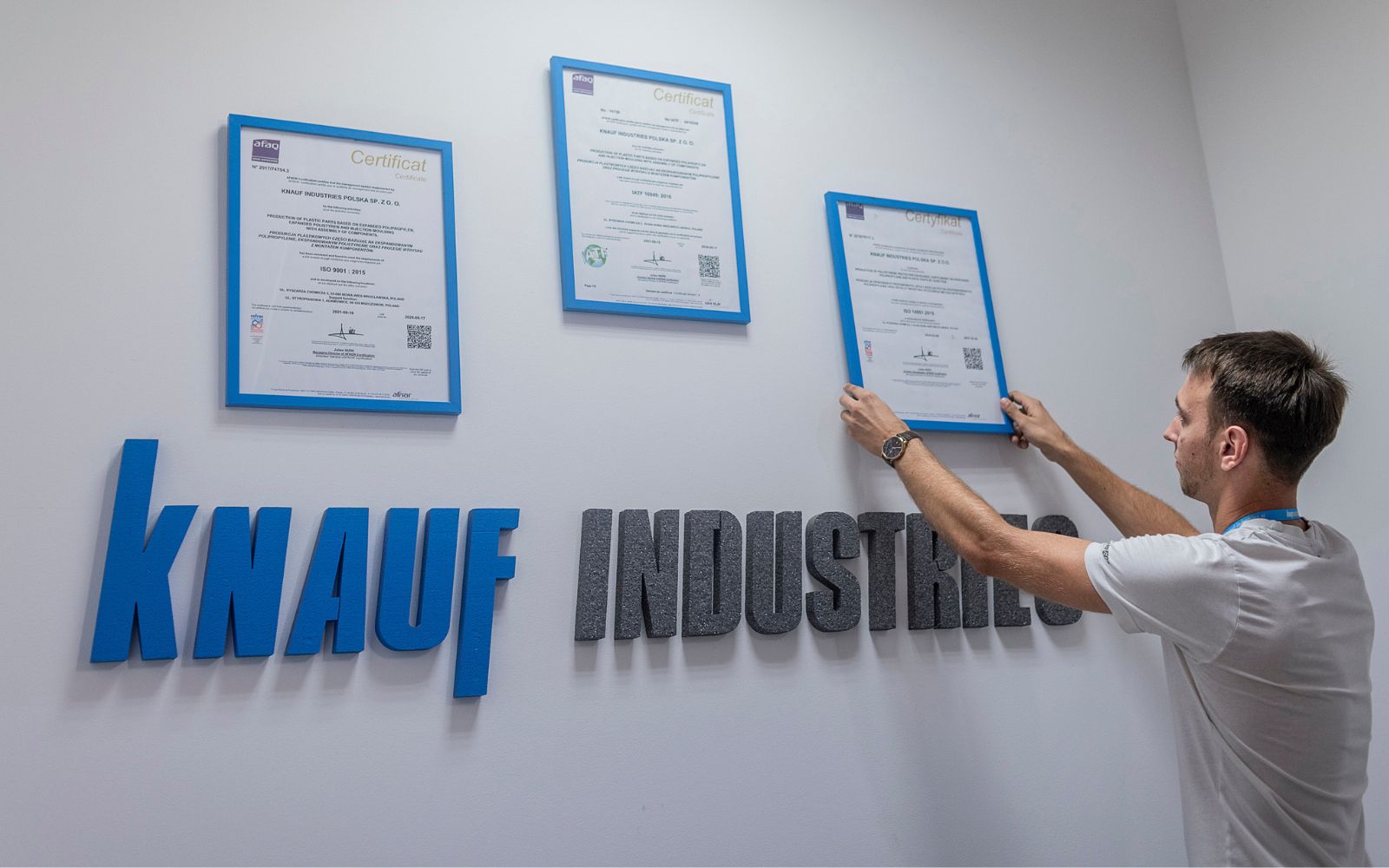The IATF 16949 standard is the international standard for quality management in the automotive industry, and its main objectives include continuous improvement, the prevention of defects and the reduction of waste in the supply chain. Find out how we implement these requirements at Knauf Industries plants and what they mean for our customers.
What is the IATF 16949 standard?
The IATF 16949 standard was created in 2016 out of the need to standardise quality management requirements in the global automotive industry. Before it was developed, there were various regional quality control systems with differing requirements for suppliers, such as the American QS-9000, the German VDA 6.1, the French EAQF or the Italian AVSQ2. Developed by the International Automotive Task Force (IATF), the standard combined them all into one global quality management standard. In fact, IATF 16949 develops and extends the requirements of ISO 9001, adapting them to the specific needs of the automotive industry. Organisations implementing IATF 16949 must therefore also comply with all the requirements of ISO 9001. This standard has been further supplemented by the specific requirements of Original Equipment Manufacturers (OEMs), which apply to suppliers of automotive parts and materials. These requirements can include quality standards, supplier audits, and product development processes, among others.
The IATF 16949 standard emphasises several key areas such as:
- detection and elimination of defects in production processes,
- optimising production processes to increase efficiency and reduce waste,
- continuous improvement of all aspects of the organisation's operations, from quality management to production processes,
- identifying and managing risks throughout the supply chain to prevent problems before they occur,
- active involvement of the highest levels of management in the quality management system, which is key to the successful implementation and maintenance of the standards derived from the standard.
How do we implement the IATF 16949 standard at Knauf Automotive?
Let’s take as an example the implementation of IATF at one of our Polish sites: Foam and injection-molding manufacturing site in Wrocław. It was carried out with the full involvement of the management, which provided the necessary support for the entire process. First an internal audit was carried out to check in which elements the current quality management system meets the requirements of IATF 16949. This has helped to identify areas for improvement. Subsequently documentation of the existing quality management system was developed and updated so that it complies with the requirements of IATF 16949.
Employees at all levels of the organisation were trained so that they can fully understand the requirements of the standard and better contribute to its implementation. In the next stage Standard compliant processes were implemented such as Statistical Process Control (SPC), Failure Mode and Effects Analysis (FMEA), Advanced Product Quality Planning (APQP) and Part Production Approval Process (PPAP). The effectiveness of these processes was monitored and measured on an ongoing basis and the data obtained was used in the continuous improvement process. The next step was regular internal audits which allowed us to assess compliance with IATF 16949 requirements and identify areas for improvement.
An independent certification company helped us prepare for the actual certification audit. With the help of an independent organisation, we were able to ensure that all the requirements of the standard were met and that our company was ready for the audit. It is worth emphasising that simply obtaining IATF 16949 certification is not the end of the story. This is because it imposes an obligation to continually improve the quality management system, which not only allows compliance with the standard to be maintained, but also to continually improve the efficiency of processes. Having IATF 16949 is an acknowledgement of attention to the highest standards not only in the product area, but also in the entire production organisation.

List of our plants that are IAFT 16949 certified:
- Sainte-Marie-en-Chanois (France)
- Arras (France)
- Cantarana d’Asti (Italy),
- Vilafranca del Penedès (Spain),
- Valladolid (Spain),
- Tanger (Morocco),
- Oebisfelde (Germany),
- Mszczonów (Poland),
- Wrocław (Poland),
- Székesfehérvár (Hungary),
- Atibaia (Brazil).
Customer benefits of our approach to IATF 16949
Companies working with IATF 16949 – compliant Knauf Industries plants gain many benefits. Above all, thanks to standardized processes and requirements for management and quality control they can be sure that the products and semi-finished products supplied to them are of a consistently high quality. The number of defective products is minimal, leading to fewer complaints, high customer satisfaction with the cooperation, and the elimination of the risk of any downtime in their production.
Greater efficiency in production processes and better coordination in the supply chain translate into shorter lead times and reduced risk of delivery delays. Our transparent processes and continuous monitoring of quality indicators enable better communication and collaboration with our customers, allowing us to respond more quickly to their changing needs and expectations.
We meet the specific requirements of Original Equipment Manufacturers (OEMs). We therefore maintain long-term business relationships with our key customers, who know our capabilities very well and see us as a trusted partner, even in a difficult market situation. We are also successively winning new contracts because we are able to provide the highest quality products and tailored services to companies of all sizes, regardless of the scale of the venture.